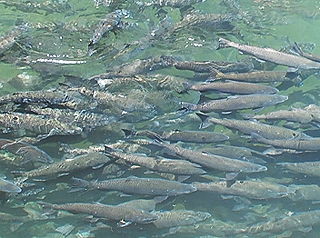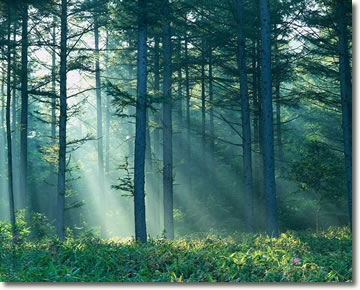Posts Tagged: biology
Bleak future for spring-run Chinook salmon
Warming streams could spell the end of spring-run Chinook salmon in California by the end of the century, according to a study by scientists at UC Davis, the Stockholm Environment Institute (SEI) and the National Center for Atmospheric Research (NCAR).
There are options for managing water resources to protect the salmon runs, although they would impact hydroelectric power generation, said UC Cooperative Extension associate specialist Lisa Thompson, director of the Center for Aquatic Biology and Aquaculture at UC Davis. A paper describing the study was published online recently in the Journal of Water Resources Planning and Management.
“There are things that we can do so that we have the water we need and also have something left for the fish,” Thompson said.
Working with Marisa Escobar and David Purkey at SEI's Davis office, Thompson and colleagues at UC Davis used a model of the Butte Creek watershed, taking into account the dams and hydropower installations along the river, combined with a model of the salmon population, to test the effect of different water management strategies on the fish. They fed in scenarios for climate change out to 2099 from models developed by David Yates at NCAR in Boulder, Colo.
In almost all scenarios, the fish died out because streams became too warm for adults to survive the summer to spawn in the fall.
The only option that preserved salmon populations, at least for a few decades, was to reduce diversions for hydropower generation at the warmest time of the year.
“If we leave the water in the stream at key times of the year, the stream stays cooler and fish can make it through to the fall,” Thompson said.
Summer, of course, is also peak season for energy demand in California. But Thompson noted that it might be possible to generate more power upstream while holding water for salmon at other locations.
Hydropower is often part of renewable energy portfolios designed to reduce greenhouse gas emissions, Purkey said, but it can complicate efforts to adapt water management regimes to a warming world. Yet it need not be all-or-nothing, he said.
“The goal should be to identify regulatory regimes which meet ecosystem objectives with minimal impact on hydropower production,” he said. “The kind of work we did in Butte Creek is essential to seeking these outcomes.”
There are also other options that are yet to be fully tested, Thompson said, such as storing cold water upstream and dumping it into the river during a heat wave. That would both help fish and create a surge of hydropower.
Salmon are already under stress from multiple causes, including pollution, and introduced predators and competitors, Thompson said. Even if those problems were solved, temperature alone would finish off the salmon — but that problem can be fixed, she said.
“I swim with these fish, they're magnificent,” Thompson said. “We don't want to give up on them.”
Other co-authors of the paper are graduate student Christopher Mosser and Professor Peter Moyle, both in the Department of Wildlife, Fish and Conservation Biology at UC Davis. The study was funded by the U.S. Environmental Protection Agency.
Forest Biology Research Center opens at UC Davis
A Forest Biology Research Center has been created at UC Davis, bringing good news for students, researchers, and all of us who like to breathe clean air.
“Trees are as important as agriculture to the landscape of California and the world,” says UC Davis Department of Plant Sciences Professor David Neale, a forest geneticist and the driving force behind the new center. “Creation of the center culminates the work of many people over many years to bring a visible presence to forest biology research and education on the UC Davis campus.”
UC Davis is a prime location for forest biology research and education because of its proximity to the Sierra Nevada and coastal mountain forest ecosystems and its extensive faculty expertise in all aspects of forest biology, says UC Davis Plant Ecology Professor Mark Schwartz, director of the John Muir Institute for the Environment (JMIE) where the new center is located.
“The creation of this forest-focused center is both an affirmation of what UC Davis has been doing really well for a long time, and a big step forward in JMIE’s efforts to rally faculty expertise around the central environmental issues facing California and the world”, Schwartz says. “As California joins Europe in adopting carbon standards, developing a better understanding of the role of forests in carbon sequestration has become a priority for environmental organizations.”
The new center will also provide a framework for the cross-disciplinary work so central to forest biology.
“Forest biology draws from many of the core biological sciences such as genetics, ecology, plant pathology, entomology, plant biology, and geography,” Neale explains. “Before this framework was in place, graduate students could study genetics with me, for example, but they couldn’t really go broader into other areas of forest biology. Now when they come to UC Davis to do graduate work in, say, ecology, they will also have access to interdisciplinary work in forest biology.”
The Forest Biology Research Center is working to develop a certificate program in forest biology that can be awarded along with a degree from an existing graduate program.
At the Forest Biology Research Center website, you can learn more about the 24 UC Davis faculty and affiliated members of the US Forest Service who founded the center. They look forward to working with others to help develop forest biology research and education at UC Davis.
In addition to Neale and Schwartz, the executive committee includes UC Davis Plant Pathology Professor Dave Rizzo, UC Davis Plant Biology Professor Alison Berry, and Research Ecologist Malcolm North with the UC Davis Department of Plant Sciences.


